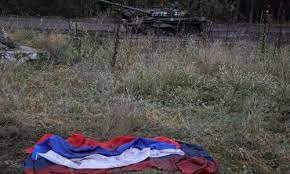Peter Pomerantsev
Beneath the veneer of Russian military “tactics”, you see the stupid leer of destruction for the sake of it. The Kremlin can’t create, so all that is left is to destroy. Not in some pseudo-glorious self-immolation, the people behind atrocities are petty cowards, but more like a loser smearing their faeces over life. In Russia’s wars the very senselessness seems to be the sense.
After the casual mass executions at Bucha; after the bombing of maternity wards in Mariupol; after the laying to waste of whole cities in Donbas; after the children’s torture chambers, the missiles aimed at freezing civilians to death in the dead of winter, we now have the apocalyptic sight of the waters of the vast Dnipro, a river that when you are on it can feel as wide as a sea, bursting through the destroyed dam at Kakhovka. The reservoir held as much water as the Great Salt Lake in Utah. Its destruction has already submerged settlements where more than 40,000 people live. It has already wiped out animal sanctuaries and nature reserves. It will decimate agriculture in the bread basket of Ukraine that feeds so much of the world, most notably in the Middle East and Africa. To Russian genocide add ecocide. The dam has been controlled by Russia for more than a year. The Ukrainian government has been warning that Russia had plans to blast it since October.
Seismologists in Norway have confirmed that massive blasts, the type associated with explosives rather than an accidental breach, came from the reservoir the night of its destruction. Some – including the American pro-Putin media personality Tucker Carlson – argue Russia couldn’t be behind the devastation, given the damage has spread to Russian-controlled territories, potentially restricting water supply to Crimea. But if “Russia wouldn’t damage its own people” is your argument then it’s one that doesn’t hold, pardon the tactless pun, much water. One of the least accurate quotes about Russia is Winston Churchill’s line about it being “a riddle wrapped in a mystery inside an enigma, but perhaps there is a key. That key is Russian national interest.” This makes it sound as if Russia is driven by some theory of rational choice – when century after century the opposite appears to be the case. Few have captured the Russian cycle of self-destruction and the destruction of others as well as the Ukrainian literary critic Tetyana Ogarkova. In her rewording of Fyodor Dostoevsky’s Russian classic novel Crime and Punishment, a novel about a murderer who kills simply because he can, Ogarkova calls Russia a culture where you have “crime without punishment, and punishment without crime”. The powerful murder with impunity; the victims are punished for no reason. When not bringing humanitarian aid to the front lines, Ogarkova presents a podcast together with her husband, the philosopher Volodymyr Yermolenko. It’s remarkable for showing two people thinking calmly while under daily bombardment. It reminds me of German-Jewish philosophers such as Walter Benjamin, who kept writing lucidly even as they fled the Nazis. As they try to make sense of the evil bearing down on their country, Ogarkova and Yermolenko note the difference between Hitler and Stalin: while Nazis had some rules about who they punished (non-Aryans; communists) in Stalin’s terror anyone could be a victim at any moment. Random violence runs through Russian history.Reacting to how Vladimir Putin’s Russia is constantly changing its reasons for invading Ukraine – from “denazification” to “reclaiming historic lands” to “Nato expansion” – Ogarkova and Yermolenko decide that the very brutal nature of the invasion is its essence: the war crimes are the point. Russia claims to be a powerful “pole” in the world to balance the west – but has failed to create a successful political model others would want to join. So it has nothing left to offer except to drag everyone down to its own depths.”How dare you live like this,” went a resentful piece of graffiti by Russian soldiers in Bucha. “What’s the point of the world when there is no place for Russia in it,” complains Putin. After the dam at Kakhovka was destroyed, a General Dobruzhinsky crowed on a popular Russian talkshow: “We should blow up the Kyiv water reservoir too.” “Why?” asked the host. “Just to show them.” But, as Ogarkova and Yermolenko explore, Russians also send their soldiers to die senselessly in the meat grinder of the Donbas, their bodies left uncollected on the battlefield, their relatives not informed of their death so as to avoid paying them. On TV, presenters praise how “no one knows how to die like us”. Meanwhile, villagers on the Russian-occupied side of the river are being abandoned by the authorities. Being “liberated” by Russia means joining its empire of humiliation.
Where does this drive to annihilation come from? In 1912 the Russian-Jewish psychoanalyst Sabina Spielrein – who was murdered by the Nazis, while her three brothers were killed in Stalin’s terror -first put forward the idea that people were drawn to death as much as to life. She drew on themes from Russian literature and folklore for her theory of a death drive, but the founder of psychoanalysis, Sigmund Freud, first found her ideas too morbid. After the First World War, he came to agree with her. The desire for death was the desire to let go of responsibility, the burden of individuality, choice, freedom – and sink back into inorganic matter. To just give up. In a culture such as Russia’s, where avoiding facing up to the dark past with all its complex webs of guilt and responsibility is commonplace, such oblivion can be especially seductive. But Russia is also sending out a similar message to Ukrainians and their allies with these acts of ultra-violent biblical destruction: give in to our immensity, surrender your struggle. And for all Russia’s military defeats and actual socio-economic fragility, this propaganda of the deed can still work.
The reaction in the west to the explosion of the dam has been weirdly muted. Ukrainians are mounting remarkable rescue operations, while Russia continues to shell semi-submerged cities, but they are doing it more or less alone. Ukraine’s president, Volodymyr Zelenskiy, has been mystified by the “zero support” from international organisations such as the UN and Red Cross. Perhaps the relative lack of support comes partly because people feel helpless in the face of something so immense, these Cecil B DeMille-like scenes of giant rivers exploding. It’s the same helplessness some feel when faced with the climate crisis. It’s apposite that the strongest response to Russia’s ecocide came not from governments but the climate activist Greta Thunberg, who clearly laid the blame of what happened on Russia and demanded it be held accountable. But there’s been barely a peep out of western governments or the UN. Pushing the strange lure of death, oblivion and just giving up is the Russian gambit. How much life do we have left in us?







